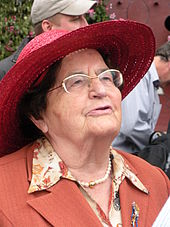Annemarie Griesinger

Annemarie Griesinger , nee Roemer, (born April 21, 1924 in Markgröningen , Württemberg ; † February 20, 2012 in Bad Urach , Baden-Württemberg ) was a German social politician ( CDU ). From 1964 to 1972 she was a member of the German Bundestag and from 1972 to 1980 Minister for Labor, Health and Social Affairs.
Life
Annemarie Griesinger grew up as the youngest child and only daughter with five older brothers in a Protestant parish family. Her father, the theologian and historian Hermann Roemer , founded the CDU local association in Markgröningen after the Second World War . After graduating from high school in 1942, she became a welfare worker at a household and social school for women and worked as a career counselor. In 1956 she worked for the Ludwigsburg district welfare organization, a member of the Junge Union and two years later of the CDU. From 1956 to 1959 she took on board positions in the North Württemberg Young Union, CDU and the CDU women's association.
In 1961 she ran on the state list for the German Bundestag , initially unsuccessfully, but then moved up for Wilhelm Hahn in 1964 when he was appointed Minister of Education for Baden-Württemberg. Her mandate was confirmed in 1965 and 1969. In the 1969 election she won the former SPD constituency of Ludwigsburg for the CDU. In 1969 she was elected one of the deputy chairmen of the CDU / CSU parliamentary group.
From 1972 Annemarie Griesinger was the first woman to be represented in the cabinet of the state of Baden-Württemberg . After the state election, Prime Minister Hans Filbinger appointed her to his cabinet as Minister for Labor, Health and Social Affairs . She held this office until 1980. During this time she campaigned for a comprehensive system of social stations and workshops for the disabled . From 1980 to 1984 she was Minister for Federal Affairs in the State Ministry of Baden-Württemberg and the Land's representative in Bonn as well as the State Government's European Commissioner. From 1981 to 1990 she was state chairwoman of the Europa-Union Baden-Württemberg and was appointed honorary chairman because of her commitment to Europe and the Europa-Union. Because of her sociability, she received the nickname "Feschtles-Marie" (Swabian stress on the first syllable of Marie ).
From 1976 to 1984 Annemarie Griesinger was a member of the state parliament for the Vaihingen state electoral district . In 1984 she retired, but remained socially active. From 1984 to 1996 she was chairwoman of the Federal Association for Life Aid .
From 1953 Griesinger was married to an economist and university professor Heinrich Griesinger. The marriage remained childless. In 1965, she was the first MP to acquire the Golden Sports Badge .
literature
- Annemarie Griesinger: Heidenei, Minister! Laughter is the best medicine. Edited by Martin Hohnecker. Hohenheim-Verlag, Stuttgart 2006 ISBN 3-89850-140-X
Web links
- Festschrift for the 80th birthday
- Griesinger, Annemarie in the Munzinger archive ( beginning of article freely available)
Individual evidence
- ↑ Who is who? The German who's who. Founded by Walter Habel. Federal Republic of Germany and West Berlin. 24th edition. Schmidt-Römhild, Lübeck 1985, ISBN 3-7950-2005-0 , p. 407.
- ↑ List of members of the German Bundestag on the German Bundestag website , accessed on February 22, 2012
- ↑ Thomas Breining: The first woman in the ministerial office. stuttgarter-zeitung.de from February 21, 2012 , accessed on February 22, 2012
- ↑ Europa-Union Baden-Württemberg mourns the loss of its former state chairwoman Annemarie Griesinger ( Memento from September 26, 2017 in the Internet Archive )
- ↑ http://www.lkz.de/home/lokales/stadt-kreis_artikel,-Annemarie-Griesinger-im-Alter-von-87-Jahren-gestorben-_arid,46076.html (link not available)
- ↑ Who is who? The German who's who. Founded by Walter Habel. Federal Republic of Germany and West Berlin. 24th edition. Schmidt-Römhild, Lübeck 1985, ISBN 3-7950-2005-0 , p. 407.
| personal data | |
|---|---|
| SURNAME | Griesinger, Annemarie |
| ALTERNATIVE NAMES | Roemer, Annemarie (maiden name) |
| BRIEF DESCRIPTION | German social politician (CDU), Member of the Bundestag, Member of the Bundestag |
| DATE OF BIRTH | April 21, 1924 |
| PLACE OF BIRTH | Markgröningen , Württemberg |
| DATE OF DEATH | February 20, 2012 |
| Place of death | Bad Urach , Baden-Wuerttemberg |

